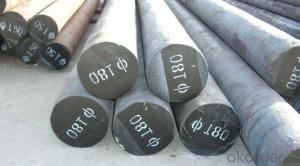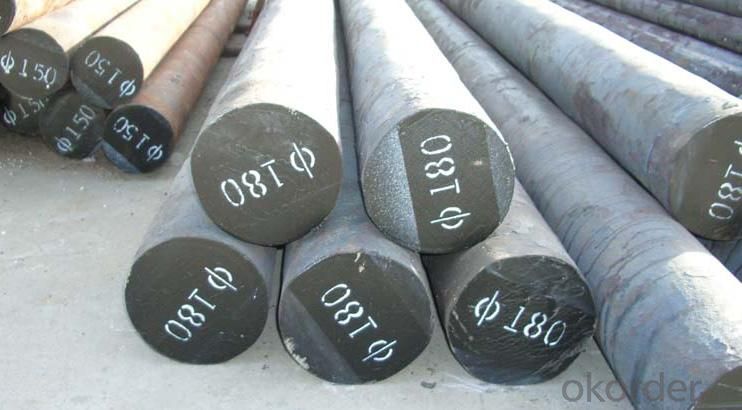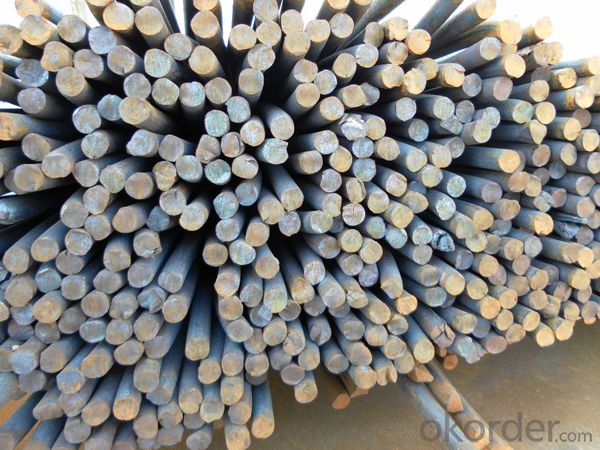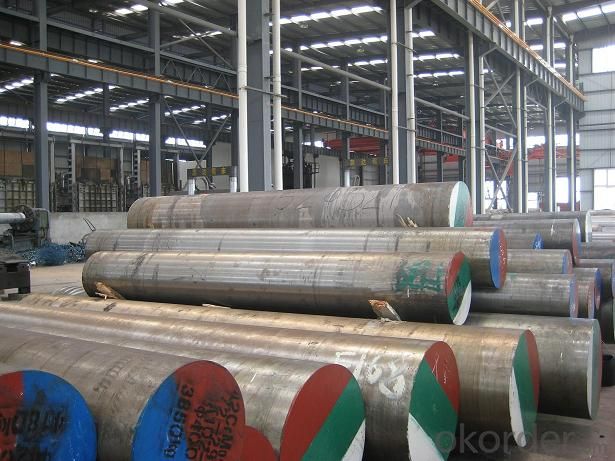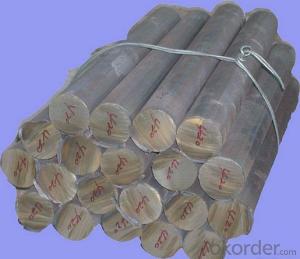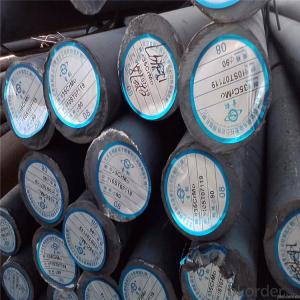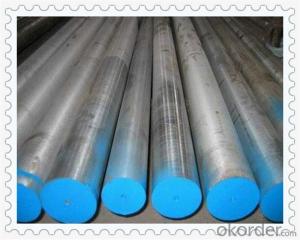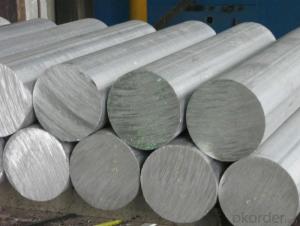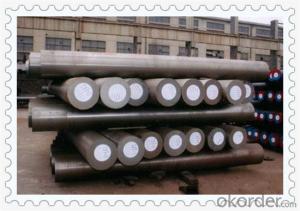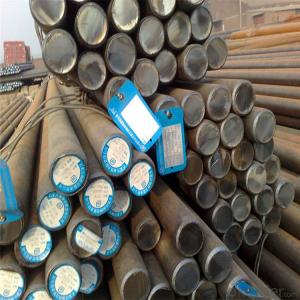9254 Steel SAE 9254 Steel Bar Steel Round Bar
- Loading Port:
- China main port
- Payment Terms:
- TT OR LC
- Min Order Qty:
- 30 m.t.
- Supply Capability:
- 10000 m.t./month
OKorder Service Pledge
OKorder Financial Service
You Might Also Like
Specification
9254 Steel SAE 9254 Steel Bar Steel Round Bar
Product information:
9254 Steel, SAE 9254 Steel Price, Steel Round Bar
Various Type
On Time Delivery,large stock
Melting process
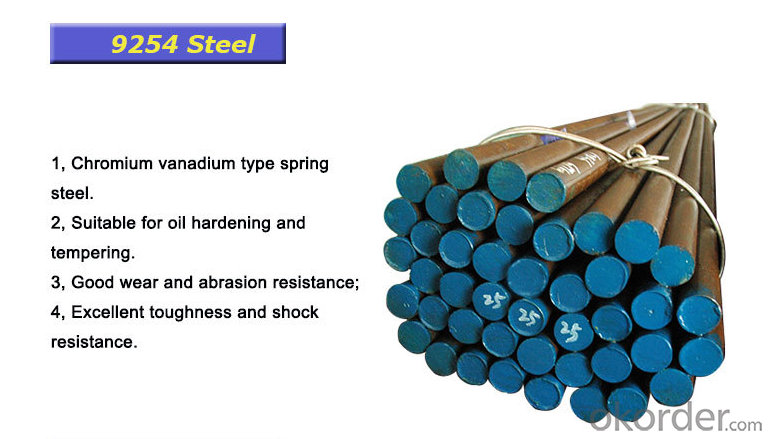
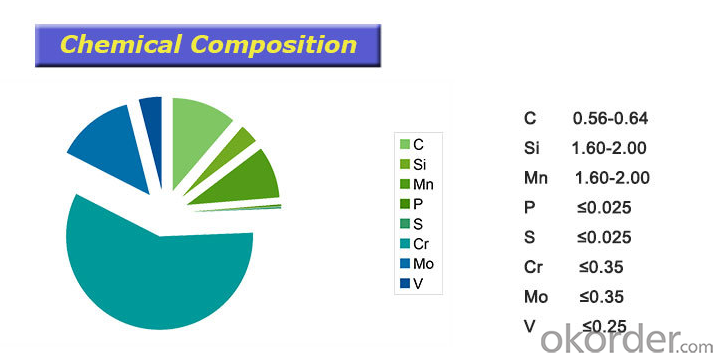
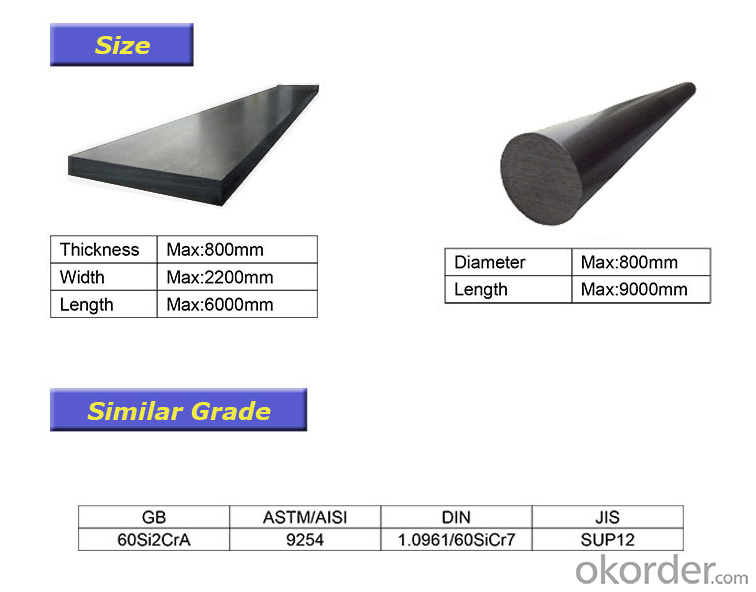
Other product show:
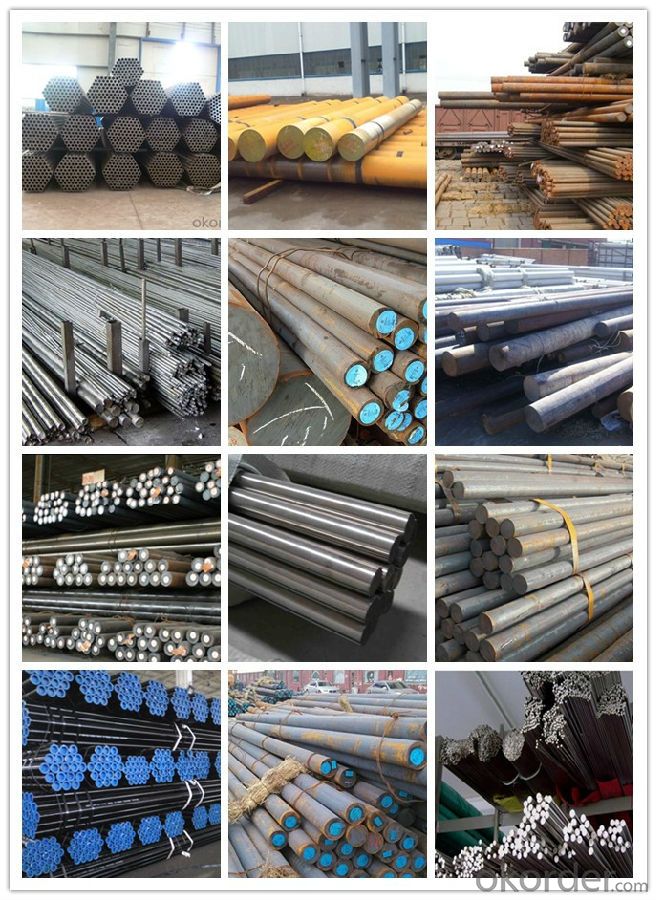
Our workshop show:
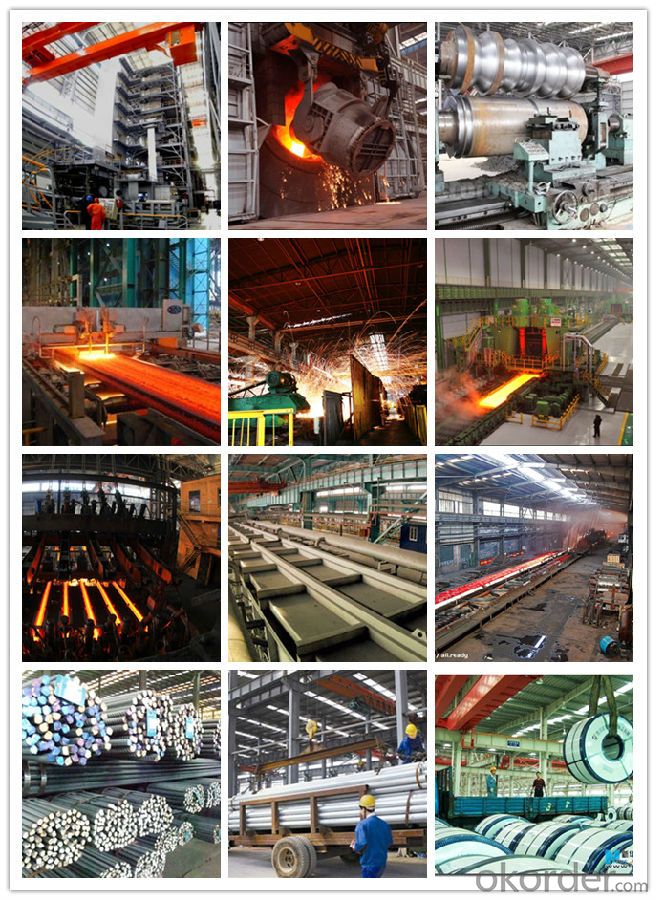
Our service:
-High manufacturing accuracy
-High strength
-Small inertia resistance
-Strong heat dissipation ability
-Good visual effect
-Reasonable price
Chose happens because of quality, then price, We can give you both.Additionally, we can also offer professional products inquiry, products knowledge train(for agents), smooth goods delivery, exellent customer solution proposals.Our service formula: good quality+good price+good service=customer's trust
SGS test is available, customer inspection before shipping is welcome, third party inspection is no problem.
If you need the sample, please feel free to let me know. Any question, we will contact you ASAP!
- Q: Can special steel be cast?
- Yes, special steel can be cast. Castings of special steel are produced using various casting methods such as investment casting, sand casting, or continuous casting, depending on the specific requirements and properties of the steel.
- Q: How does special steel perform in high-pressure and high-temperature environments?
- Special steel is specifically engineered to excel in environments with high pressure and temperature. It possesses unique qualities that allow it to withstand extreme conditions without deforming, corroding, or failing. One of the main attributes of special steel is its exceptional strength. It is designed to have superior mechanical properties, including outstanding tensile strength. This enables it to resist the immense pressure exerted on it in high-pressure environments, ensuring that it maintains its structural integrity and does not buckle or collapse under the force. Furthermore, special steel is highly resistant to corrosion and oxidation, even at elevated temperatures. This resistance is crucial in high-temperature settings where hot gases, steam, or corrosive chemicals can cause regular steel to deteriorate rapidly. Special steel's ability to resist corrosion and oxidation ensures its longevity and reliability, making it an ideal choice for applications in challenging conditions. Additionally, special steel exhibits excellent heat resistance. It can endure extreme temperatures without compromising its mechanical properties, such as strength and hardness. This characteristic is vital in high-temperature environments where conventional steel would weaken, soften, or even melt. Special steel's capacity to maintain its structural stability even in extreme heat guarantees the safety and reliability of equipment and structures operating in such conditions. Moreover, special steel is renowned for its exceptional thermal conductivity. This property allows it to efficiently transfer heat away from the high-temperature environment, preventing localized hotspots and thermal stress. By effectively dissipating heat, special steel ensures the overall stability and performance of equipment and structures under high-pressure and high-temperature conditions. In conclusion, special steel excels in high-pressure and high-temperature environments due to its superior strength, resistance to corrosion and oxidation, heat resistance, and excellent thermal conductivity. These qualities make special steel a reliable and durable material for various applications, including power generation, oil and gas exploration, aerospace engineering, and many others.
- Q: What are the different nuclear grades of special steel?
- There are several nuclear grades of special steel, including but not limited to A508 Class 1, A533 Type B Class 1, A533 Type B Class 2, A508 Class 2, A533 Type C Class 1, A508 Class 3, and A533 Type C Class 2. These grades are specifically designed to meet the stringent requirements of nuclear power plant applications, ensuring high strength, resistance to radiation damage, and excellent fracture toughness.
- Q: What are the main characteristics of creep-resistant steel?
- Creep-resistant steel, characterized by its high resistance to deformation caused by prolonged exposure to high temperatures and stress, possesses several key features: 1. It can withstand extremely high temperatures without significant deformation, making it ideal for applications in power plants, boilers, and gas turbines, where materials are exposed to elevated temperatures for extended periods. 2. It exhibits excellent mechanical properties, including high tensile strength and toughness, enabling it to endure stress and pressure, even at high temperatures. 3. It is highly resistant to corrosion and oxidation, owing to its alloying with elements like chromium, molybdenum, and nickel. This makes it suitable for use in environments with moisture, chemicals, and gases. 4. It maintains its shape and size under prolonged exposure to high temperatures and stress, ensuring dimensional stability and preserving the integrity of structures or components. 5. Its combination of high temperature resistance, strength, and corrosion resistance contributes to its durability and longevity, reducing the need for frequent maintenance and replacement. This improves the overall efficiency and cost-effectiveness of applications relying on creep-resistant steel. In conclusion, creep-resistant steel is specifically designed to endure the challenging conditions of high temperatures and stress, making it the preferred choice in industries prioritizing reliability and safety.
- Q: How does special steel contribute to the fatigue resistance of products?
- Special steel contributes to the fatigue resistance of products through its unique properties and manufacturing processes. Firstly, special steel is specifically designed and engineered to have enhanced strength and durability, making it highly resistant to fatigue. This is achieved by incorporating alloying elements such as chromium, nickel, molybdenum, and vanadium, which improve the material's ability to withstand cyclic loading and stress. In addition, special steel undergoes rigorous heat treatment processes, such as quenching and tempering, to further enhance its fatigue resistance. These processes help refine the microstructure of the steel, resulting in a more uniform and fine-grained material. This, in turn, improves the steel's resistance to crack initiation and propagation, which are key factors leading to fatigue failure. Moreover, special steel often undergoes specialized surface treatments, such as shot peening or nitriding, which introduce compressive residual stresses on the surface of the material. These compressive stresses act as a barrier against crack formation and growth, significantly enhancing the fatigue resistance of the product. Additionally, special steel can be manufactured with specific grain orientations, such as through the use of directional solidification techniques. This allows for the alignment of grains along the primary loading direction, improving the material's fatigue performance by reducing the likelihood of crack initiation at grain boundaries. Overall, the unique properties and manufacturing processes associated with special steel contribute to its exceptional fatigue resistance. Its enhanced strength, refined microstructure, specialized surface treatments, and tailored grain orientations all work together to prolong the lifespan and reliability of products, making special steel a preferred choice in various industries where fatigue failure is a concern.
- Q: How does special steel perform in chemical processing applications?
- Special steel is widely used in chemical processing applications due to its excellent performance and unique properties. One of the key advantages of special steel in chemical processing is its high resistance to corrosion. This type of steel is specifically designed to withstand harsh chemical environments, making it highly reliable and durable. In chemical processing applications, where corrosive substances are present, special steel provides superior protection against corrosion compared to other materials. It exhibits exceptional resistance to acids, alkalis, and various chemical compounds, ensuring the integrity and longevity of equipment and components. Moreover, special steel offers excellent mechanical properties, such as high strength and toughness, which are essential in chemical processing applications. It can withstand high temperatures, pressure, and mechanical stresses commonly encountered in these environments. Its robustness and ability to maintain structural integrity under extreme conditions make it a preferred choice for critical components like reactors, vessels, and piping systems. Special steel also contributes to the overall efficiency and safety of chemical processing operations. Its resistance to scaling and fouling reduces the risk of contamination and blockages, minimizing downtime for cleaning and maintenance. This results in improved productivity and cost-effectiveness. Furthermore, special steel is often selected for its hygienic properties, making it suitable for applications in the food and pharmaceutical industries. It is easy to clean and sanitize, ensuring the highest levels of product purity and compliance with industry regulations. In summary, special steel performs exceptionally well in chemical processing applications. Its corrosion resistance, mechanical strength, thermal stability, and hygienic properties make it an ideal choice for equipment and components, enhancing the reliability, efficiency, and safety of chemical processing operations.
- Q: How does special steel contribute to the automotive parts industry?
- Special steel plays a crucial role in the automotive parts industry by providing enhanced strength, durability, and performance to various components used in vehicles. With its unique properties, special steel helps in improving the overall safety, reliability, and efficiency of automobiles. One of the key contributions of special steel to the automotive parts industry is its ability to withstand high temperatures, pressures, and extreme conditions. This makes it ideal for manufacturing engine parts such as crankshafts, camshafts, and connecting rods, which are subject to intense mechanical stress and heat. Special steel ensures that these critical components can endure the demanding conditions of combustion engines, resulting in improved engine performance and longevity. Another significant contribution of special steel is its corrosion resistance. Automotive parts are exposed to various corrosive elements like moisture, chemicals, and road salt. Special steel enables the production of corrosion-resistant parts such as exhaust systems, suspension components, and brake rotors, which are vital for maintaining the structural integrity and safety of vehicles over time. Moreover, special steel offers exceptional formability and weldability, allowing manufacturers to produce complex automotive parts with precision and ease. This versatility makes it possible to create lightweight yet strong components like chassis, body panels, and suspension arms, which contribute to fuel efficiency, handling, and overall vehicle performance. Furthermore, special steel's high tensile strength and toughness contribute to the safety of vehicles by ensuring the structural integrity of safety-critical parts such as steering columns, seat frames, and roll bars. These components play a vital role in protecting occupants during accidents and collisions, making special steel an essential material for enhancing overall vehicle safety. In conclusion, special steel's unique properties and characteristics significantly contribute to the automotive parts industry. Its strength, durability, corrosion resistance, formability, and weldability make it an ideal material for manufacturing critical components in automobiles. By incorporating special steel into various parts, vehicles can achieve improved performance, safety, and reliability while meeting the demands of modern automotive standards.
- Q: How does special steel contribute to reducing product rejection rates in quality control?
- Special steel contributes to reducing product rejection rates in quality control by providing superior strength, durability, and resistance to wear and tear. These properties enable the production of high-quality components and eliminate common defects such as distortion, cracking, or premature failure. Additionally, special steel's precise composition and manufacturing processes ensure consistency and accuracy in the final products, reducing the likelihood of manufacturing errors and subsequent rejection during quality control inspections.
- Q: What are the main properties of special steel?
- Special steel is characterized by a variety of properties that set it apart from regular steel. Some of its key properties include high strength, excellent corrosion resistance, superior heat resistance, exceptional toughness, and good wear resistance. Additionally, special steel can be easily machined, welded, and formed, making it highly versatile for various industrial applications.
- Q: What are the different aerospace grades of special steel?
- Some of the different aerospace grades of special steel include 15-5PH, 17-4PH, 300M, 4130, 4340, 440C, and H11. These grades are specifically designed to meet the high-performance requirements of the aerospace industry, providing excellent strength, corrosion resistance, and heat resistance properties.
Send your message to us
9254 Steel SAE 9254 Steel Bar Steel Round Bar
- Loading Port:
- China main port
- Payment Terms:
- TT OR LC
- Min Order Qty:
- 30 m.t.
- Supply Capability:
- 10000 m.t./month
OKorder Service Pledge
OKorder Financial Service
Similar products
Hot products
Hot Searches
Related keywords
